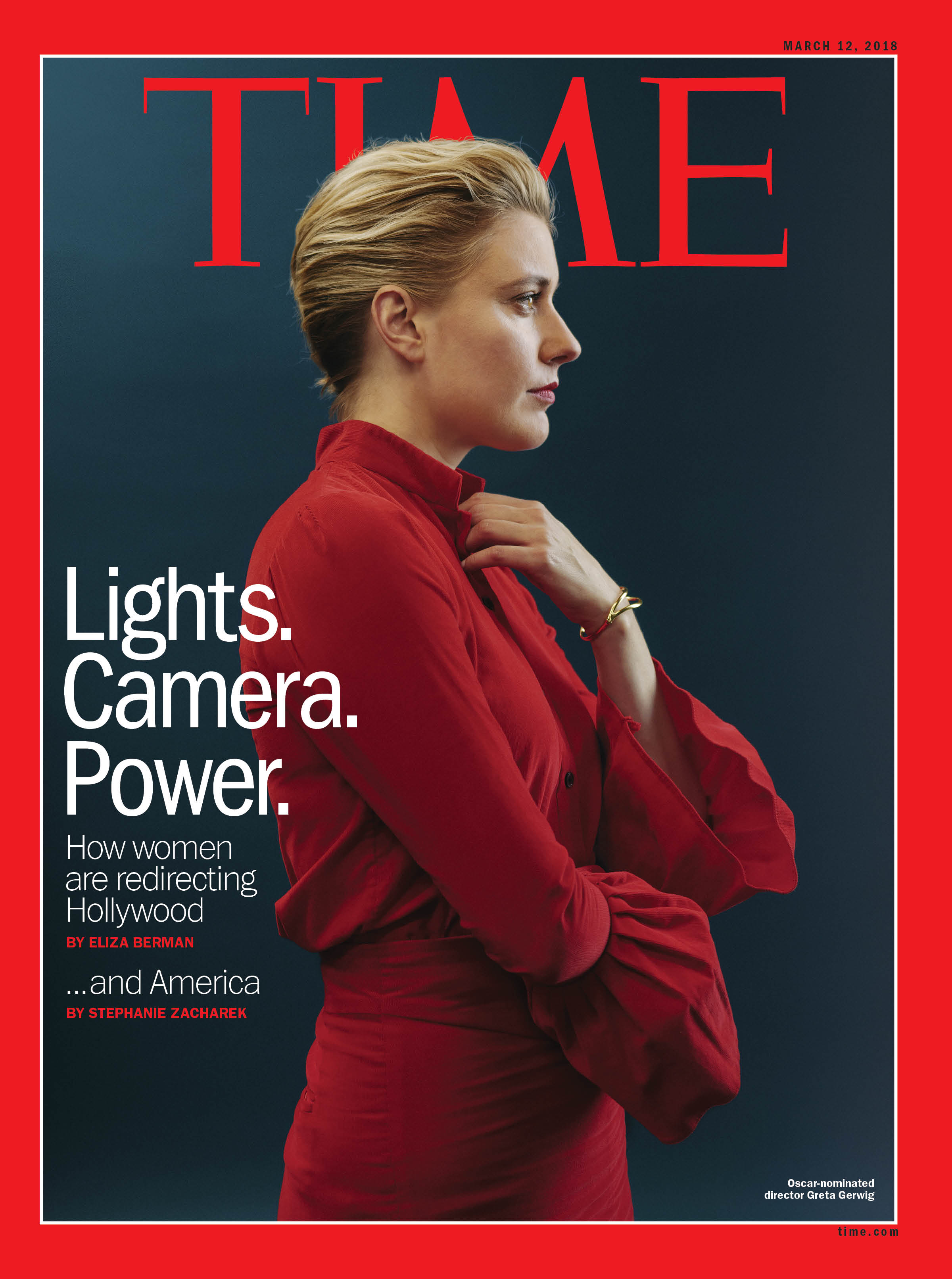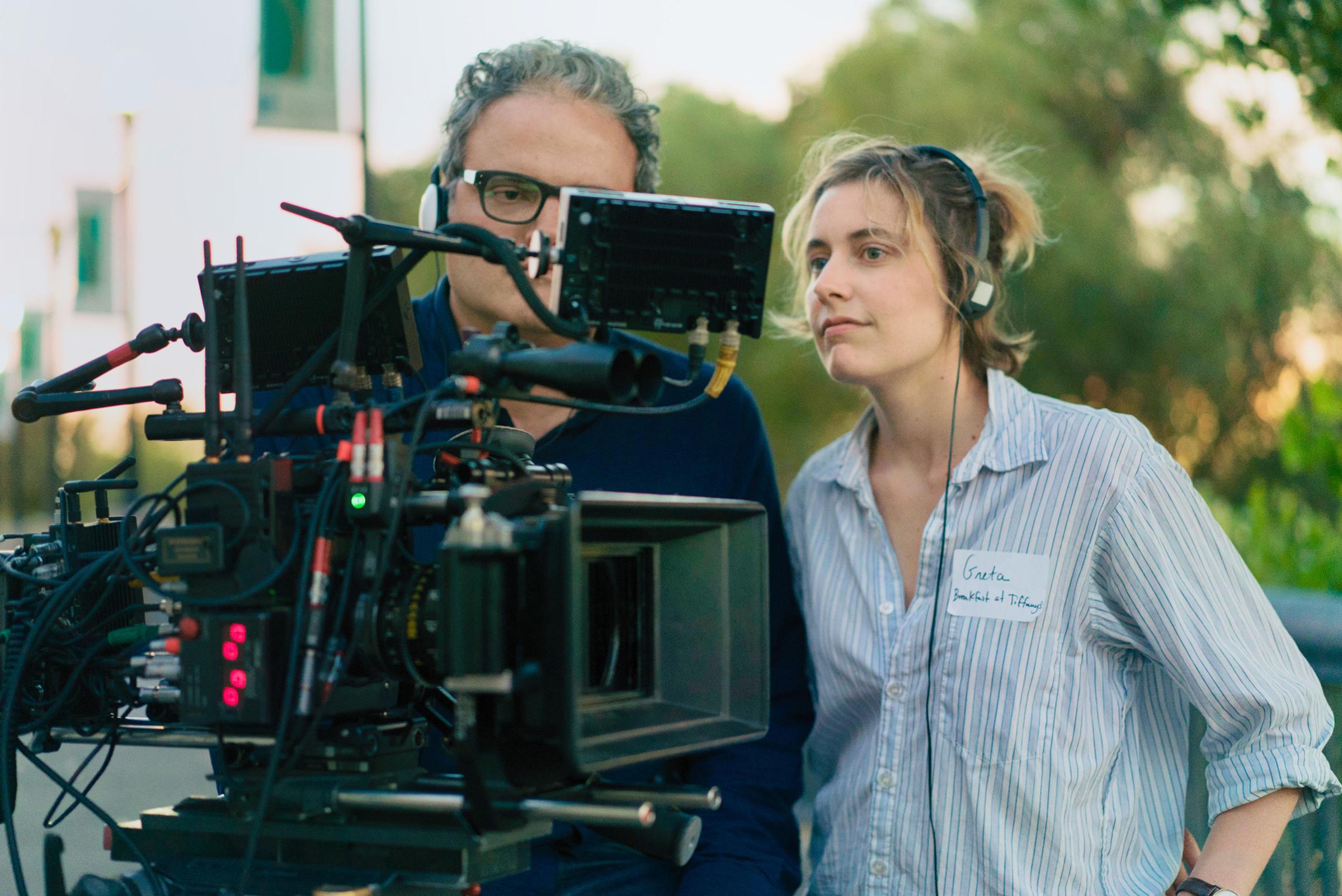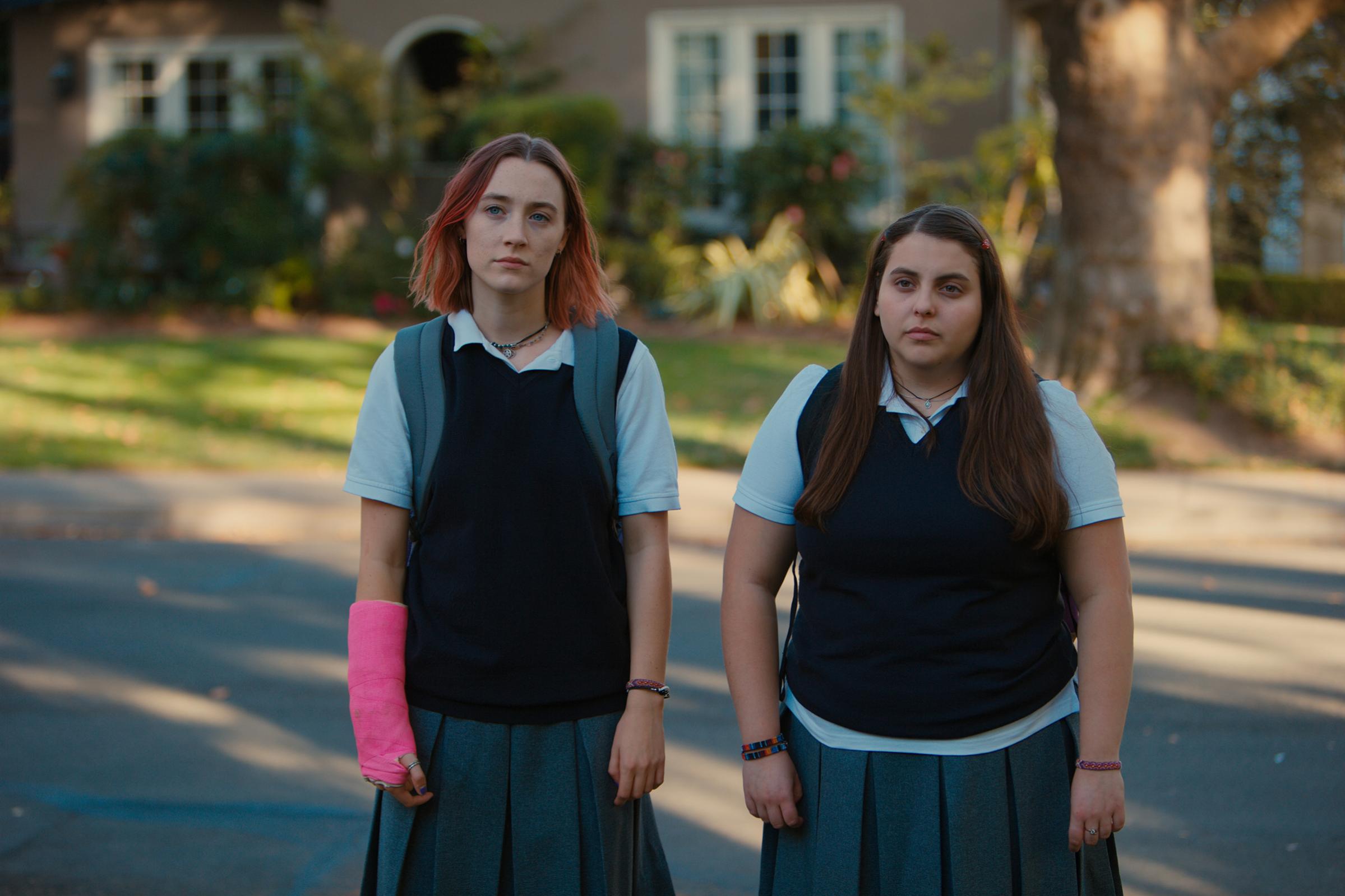Greta Gerwig is standing at a corner in Chinatown, trying to figure out the way to Brooklyn. She’s spent nearly half her life in New York City, but we’re at that point in lower Manhattan where the grid devolves into a patchwork maze. After lunch in the West Village, she suggested—on this frigid February day, with flurries swirling about and a doggie bag of half-eaten pasta Bolognese in her backpack—that we trek across the island, and then a bridge, before she heads to pedestrian-averse Los Angeles the next day. Gerwig likes to walk, often as a remedy for writer’s block. It’s when you’re walking, she insists, that life happens to you.
Much has been happening to Gerwig lately. After a decade spent in front of the camera, she released her solo-directorial debut, Lady Bird, last fall. The film has since been nominated for five Oscars, including Best Director. This shouldn’t be any more noteworthy than another film’s success, but it is—women behind the camera rarely get mainstream recognition for their work. The nod makes Gerwig just the fifth woman nominated for directing in 90 years of Academy Awards—and the first female nominee since Kathryn Bigelow became the only woman to win, for The Hurt Locker in 2010.
That Gerwig, 34, did it with Lady Bird—which shares some DNA with her Sacramento upbringing—is remarkable, not just because it took half a decade to make and twice as long to find the courage. Its story—about a high school senior trying out for the musical and losing her virginity and infuriating her mom and attempting desperately to leave her hometown in the rearview—is one we think we’ve seen, but never in quite this way. It’s one of few Best Picture nominees to take a teenage girl’s interior life seriously. And it’s hitting its peak at a moment when teens, at gun-control rallies and voter-registration drives, are proving themselves to be concerned with much more than the worlds inside their smartphones.

For a movie that could easily be written off as small—no explosions or weighty historical crises here—the reception has been huge. The National Society of Film Critics named Lady Bird Best Picture, and the New York Times’ A.O. Scott called it “perfect.” Steven Spielberg specifically requested a seat next to Gerwig at the Oscar nominees’ luncheon. And Lady Bird‘s Oscar-nominated star Saoirse Ronan says that it wasn’t until she saw Gerwig in action that her own dream to direct came into focus.
The movie has also resonated with audiences. The owner of a stately blue Sacramento house used as a filming location now has droves of devotees taking selfies outside her window on a kind of pilgrimage. There are more than a few testimonials online from daughters who, after seeing the film, called their mothers to apologize for their nightmarish teenage behavior. And a lone film blogger drew the ire of fans when he sullied Lady Bird‘s perfect Rotten Tomatoes score. (The critic entered his review as “rotten” because he thought the film didn’t deserve to be “the all-time best reviewed movie” on the review aggregator.)
In Lady Bird, on movie screens from Sacramento to Brooklyn, women and girls are seeing themselves reflected in all their warts and glory: Mothers whose love for their daughters has at times filtered messily through envy and resentment. Women whose double shifts as nurses or police officers render magazines in the supermarket checkout line an extravagance. Girls who’ve grown accustomed to being told, through images, that their lives are unworthy of thoughtful consideration. Lady Bird is the kind of movie that can make you a little more generous, and a little kinder, not least of all to yourself.
Gerwig has at once become her own success story and a symbol of the future of storytelling—of the not-so-radical notion that we may, perhaps even soon, get to stop qualifying director with female. She knows the power of seeing someone like yourself out there doing the thing you yearn to do. But she’s hopeful for a time when we won’t need to count every woman’s accomplishment as evidence. “You just look forward to the day,” she says, “when it doesn’t mean anything.”

Some kids grow up practicing Oscar speeches in the mirror. But when she was a kid in Sacramento, Gerwig barely even went to the movies. When she did, she didn’t think about them as being directed—they just seemed like “whole things handed down from gods.” Even among mortal creators, scant few were women. “There was Jane Campion, Nancy Meyers, Nora Ephron, Amy Heckerling,” Gerwig says as she counts the few she can recall on one hand. “Not a lot.”
It wasn’t until she was at Barnard College that she realized she might want to add her name to that very short list. But directing just didn’t seem like a realistic career option. So she immersed herself in theater, her childhood passion, working summers as a stage manager at places like the Ontological-Hysteric Theater. As she was finishing school, she began acting in low-budget mumblecore films like Hannah Takes the Stairs and Nights and Weekends (which she co-directed), known for their improvised performances and nonchalant approach to plot.
At the South by Southwest Film Festival in 2006, her senior year, she saw a film directed by a woman around her age. “I thought, Wait, are we allowed to do that? Who told you you could?” And then she realized: “Nobody told her. She was just gonna do it, like the guys were doing it.” It was one in a series of moments, many involving female directors giving her advice and encouragement, that led to her deciding to do it too.
We are still waiting for her meal to arrive, prior to our epic walk, when an angelic voice emerges from her phone: “Sail away, sail away, sail away.” Before picking it up, she apologizes: “Oh, sorry—I have Enya as my ringtone.” After she finishes a brief phone conversation, she explains, “The phone ringing is an anxious event, and Enya always calms you down.” Gerwig has a calm presence to begin with. In conversation, she is earnest, with her shaggy blond hair taking on new configurations each time she runs a hand through it. She’ll go deep on Tolstoy (the way he shifts narrative perspective to the dog in Anna Karenina) and Tina Fey (how she learned to listen through improv) in the space of a minute.
In many ways, the 25 films she appeared in over the course of a decade served as a substitute for film school. She’s best known for her flaky aspiring dancer in 2013’s Frances Ha, which she co-wrote with director Noah Baumbach, now her partner of several years. She received a Best Actress Golden Globe nomination for the role. But for all that she put into the performance, she was working overtime after her scenes were done, loitering on set to take notes on the lighting and production design. “When you’re an actor on a movie, people don’t kick you off the set,” she explains. “They assume you have a right to be there.”
As she immersed herself in this self-directed curriculum, she continued acting in films like the historical drama Jackie and the acclaimed coming-of-age indie 20th Century Women. She missed sitcom fame when a How I Met Your Mother spin-off she starred in failed to get picked up. She also appeared in Woody Allen’s 2012 film To Rome With Love. Of the allegations that Allen abused his adopted daughter Dylan Farrow, she has said that she would not have worked with him had she known what she knows today, and she won’t work with him in the future. Farrow tweeted her appreciation in response, writing, “Thank you for your words. Please know they are deeply felt and appreciated.”

The meticulous preparation Gerwig put herself through, over many years, seems less typical of young male directors. “It might be gendered, it might be a variety of other things. I had this sense of needing to be prepared,” she says. “It does seem to be something women struggle with more.” But she knew when the time had come: “It does reach a point where you think, If I fall on my face and it’s dreadful and everybody says it’s dreadful, I’d rather have tried than not.”
Now she is eager to apply her talents to a different kind of story. She isn’t bound to the constraints of modest indies, she says. In fact, she wants to make a leap in scale, in the mold of Spielberg, who in her view has mastered the art of making genre movies personal. While Lady Bird trades in purposefully “unadorned cinematic language”—conversations in cars and schoolyard skirmishes—for her next trick she’ll need CGI and special-effects teams. She’ll act again, for the right director with the right project—this summer she’ll shoot a drama with the French director Mia Hansen-Love—but her priority is clear. “It’s important to know at any given moment what you would drop everything for,” she says. “I would drop everything to write and direct movies.”
For years, there has been a sense that Hollywood is on the precipice of a change that never arrives. The so-called Bridesmaids effect, proclaimed following that film’s blockbuster performance in 2011, failed to fully come to fruition. In 2017, many wondered if the Wonder Woman effect would prove similarly meaningless. But women’s ups and downs in the industry are as old as Hollywood itself.
Women worked in great numbers at every level of production during Hollywood’s first two decades. But the studio system born in the late 1920s introduced a gendered division of labor that persists to this day. As Gerwig began entertaining thoughts of making her own movies, women comprised less than 3% of top-grossing studio directors.
There’s reason to believe that this time, the currents of change constitute more than just a passing breeze. This month brings the fourth $100 million movie solo-directed by a woman, Ava DuVernay’s A Wrinkle in Time. There are more female-helmed studio movies on the horizon, including Niki Caro’s live-action Mulan and Gina Prince-Bythewood’s Spider-Man spin-off Silver & Black. All of this groundwork was laid before the downfall of Harvey Weinstein.
The era of accountability ushered in by the #MeToo movement doesn’t apply only to sexual misconduct in the workplace. Failing to hire female directors has long seemed out of step. Now it’s bad for business. To Amy Pascal, a producer and former Sony executive and one of a small number of women ever to lead a studio, the reckoning around sexual harassment and assault in the entertainment industry “has led to a self-evaluation of Hollywood that’s only going to be good.”
Actors like Reese Witherspoon and Viola Davis, tired of waiting around for good roles, have turned to producing and developing female-centric material for themselves and others. “Women working together in groups for change is the point,” says Pascal. “That’s what hadn’t happened before and that’s what’s going to make a big difference.”
This renewed energy is mobilizing women of all backgrounds. “There are more and more talented women of color who aren’t just telling their stories—who frankly are building empires,” says director Karyn Kusama, known for horror films like Jennifer’s Body and The Invitation. “We need empire builders, and we need some of them to be Latinas, to be black women, to be Asian women. We need all kinds of people in the mix to make for a vibrant culture that survives.”
That Gerwig, with her Oscar nominations, now occupies anointed Hollywood status doesn’t just mean that we’ll get to see more from the brain that conjured Lady Bird, or that there’s another role model for girls who dream of directing. A 2015 report by the Center for the Study of Women in Television and Film found that female directors and producers were more likely than men to hire women to serve other key roles on set. Women comprised more than half of the writing staff on female-directed films but only 8% on male-directed films. Editors and cinematographers fared significantly better as well. Women in film, in other words, beget women in film.
But it’s not just getting there that’s the challenge. Female directors’ careers are typically two to three decades shorter than males’. They are more likely than men to direct one studio film and not receive another offer. And there are other considerations that keep women on the sidelines. Says Gerwig, when we get onto to the topic of motherhood: “I’m still terrified that it makes you not hireable.” I ask her to define “it”—just the fact of being of childbearing age? She nods. “You can sure as f-ck know that if you were talking to a 34-year-old male director, they would not be thinking about this.”
But women are thinking about it, and giving voice to it and a host of other barriers that for so long went unquestioned. “It feels like not being able to see orange, and then all of a sudden you can see orange,” she says. “You realize orange is everywhere and how much you’d internalized.” Once you have women in numbers naming the problems and tackling them together, she says, “I don’t think it will go back to business as usual.”
Two hours into our walk, we’ve nearly crossed the bridge, with Brooklyn’s tree-lined waterfront coming into sharp relief. I ask if more fans have approached her since her full-court press tour for Lady Bird. She says yes, somewhat—mostly young women. Just the other day, she was at the airport and a 20-something woman stopped her. “She said, ‘Thank you for your movies. I want to make movies.'” Gerwig, in what is now becoming a regular practice, made the young woman look at her and promise to her face that she would make them. “She was like, ‘I’m trying to,’ and I was like, ‘No, no, no. Go make it!'” Gerwig’s friend, who was traveling with her, observed that the tactic seemed a bit aggressive. But that’s the point.
It’s not far-fetched to imagine that one of these women will stand at a podium as Gerwig has done many times this awards season, clutching her hardware and recounting the story of an Oscar-nominated director getting in her face to extract a sacred vow. “I mean, it’s going to happen,” she says, smiling. “I can’t wait.”
More Must-Reads from TIME
- Cybersecurity Experts Are Sounding the Alarm on DOGE
- Meet the 2025 Women of the Year
- The Harsh Truth About Disability Inclusion
- Why Do More Young Adults Have Cancer?
- Colman Domingo Leads With Radical Love
- How to Get Better at Doing Things Alone
- Michelle Zauner Stares Down the Darkness
Write to Eliza Berman at eliza.berman@time.com